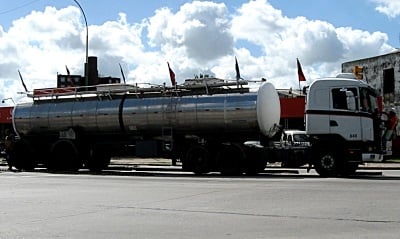Recent Fuel Changes and How They Affect You: Part 3
As a service to our customers, dealers and friends, Bell Performance hosts quarterly webinars on fuel topics of interest to their friends and their...

As a service to our customers, dealers, and friends, Bell Performance hosts quarterly webinars on fuel topics of interest to their friends and their customers. This is a transcript of one of these recent webinars held on Fuel Changes & The Impact They Have On You And Your Business. If you would like to watch the archived presentation, please click here.
This webinar was presented by Erik Bjornstad, Bell Performance technical information director.
The topic we're going to be discussing today is recent fuel changes and how those fuel changes affect you. Specifically, we're going to be looking at some of the key ways that fuels have changed. We're going to be talking specifically about gas and diesel. We're going to be talking about how and why those changes came about. We're going to talk about the consequences and the problems arising from those changes and what those look like in practice, where you are at, and then finally, we're going to be talking about some of the best practices within the industry to address those problems that people are coming up against.
There was a Greek philosopher about 2500 years ago, [Heraclitus 00:01:25], who said that the one thing that doesn't change is that things change. That's certainly true of the gas and the diesel fuels that we use today. Gas and diesel have changed markedly throughout the years. They have changed in response to the needs of the consumer and also the needs of the equipment that uses those. Engines are completely different from those they were in the late 19th and, first half of the 20th century. Now you've got common real diesel engines, you've got gas engines with much higher compression ratios, and they've had to change the fuels in order to keep up with those, and in order for those to meet the needs of the consumers. Technology's changed; fuels have changed. The world itself has changed markedly. That's one thing that we're going to talk about in order to try and give some context to all of this, and specifically, we're going to start by looking at the issue of energy in the world, the supply and the demand, and how that has changed from years past.
Back about 10 years ago, there was a book written by Thomas Friedman called The World Is Flat. It was a very interesting book, and the main thesis was that the world is changing markedly. People are more connected, and the world is actually getting smaller because of the way we're able to connect with other people in ways that we were not able to before. One of the big things he talked about is the fact that the developing world is growing and consuming resources at a much faster rate than it used to. For example, just look at internet usage. Here in the United States and in Europe, we're used to thinking of the internet as our domain. We're the ones who use it. The third world doesn't tend to use it, that's what we think, but in the United States, we have about 270 million people who use the internet out of our total population of 350 million. China has 650 million internet users. India has 352 million users. That's more people than in the entire United States, yet we don't think of those developing countries as people who use that to any great extent, but they do.
 Looking specifically at energy, we ask the question, "Who's using the energy?" Well, in 2012, the International Energy Agency reported that for the first time in recorded history, oil consumption in developing countries actually surpassed developed countries. It was the first time in history that had ever happened. If you go back to the year 2000, the start of the 21st century, the developing world was using 70% of the energy. Now, their demand has surpassed what the developed world is using. The developing countries we're talking about are China and India, but also countries in Southeast Asia, countries that used to be considered third world and by and large probably still are, but they have a growing population that is basically reaching out and trying to grab their share of the world's resources. When you have this demand that is growing and growing, sometimes the ability to supply that demand struggles to keep up. In that respect, what we're talking about is refining capacities, the ability to take crude oil and turn it into the things that people tend to use, gas and diesel.
Looking specifically at energy, we ask the question, "Who's using the energy?" Well, in 2012, the International Energy Agency reported that for the first time in recorded history, oil consumption in developing countries actually surpassed developed countries. It was the first time in history that had ever happened. If you go back to the year 2000, the start of the 21st century, the developing world was using 70% of the energy. Now, their demand has surpassed what the developed world is using. The developing countries we're talking about are China and India, but also countries in Southeast Asia, countries that used to be considered third world and by and large probably still are, but they have a growing population that is basically reaching out and trying to grab their share of the world's resources. When you have this demand that is growing and growing, sometimes the ability to supply that demand struggles to keep up. In that respect, what we're talking about is refining capacities, the ability to take crude oil and turn it into the things that people tend to use, gas and diesel.
The refining capacity of the world has struggled to keep up with the demand. Now, go back to 1982, the United States had about 300 refineries that had the capacity to refine 17 million barrels of oil per day.
Fast forward about 30 years to 2013, the United States had 139 refineries, less than half, but they still had the same capacity, 17 million barrels a day. You've got half the refineries refining the same amount of fuel, which means they're twice as efficient doing it, but they're also under twice as much pressure to keep producing that. If they stop, then there's going to be problems. We've all seen what happens when a storm hits the Southeast and knocks out a refinery in Louisiana. Gas prices shoot up because all of the refineries are working at a breakneck pace just to keep up with the demand. Demand is something that we're going to come back to a little bit later and talk about a little more because it's definitely one of the drivers for this issue of how fuel has changed. Another key driver is the environmental movement. Whether you want to call it green consciousness, whether you want to call it being a friend of Mother Earth, whatever you want to call it, there are more and more people now who are concerned about the environment than ever before. When the populace is concerned, Congress and government tend to get involved.
They are more likely to take action if the people are more concerned about it, and so what you've got is you've got increased green consciousness that has led to more Congressional action, and that Congressional action is what has impacted the fuels that we use today. One of the things we're going to mention a bit later is the Clean Air Act of 1990/1992. That is a key event that changed the fuels that we use, and caused some of the changes that we're going to talk about and what has brought us to our current situation. What we're going to do now is we're going to talk about some of the big changes that have happened in the fuels. We're going to talk about why those happened. We're going to talk about how those specifically changed. Specific things in the fuel have caused specific problems that you might be seeing now. We're going to be doing a lot of contrasts between looking at what fuels used to look like before 20, 30, 40 years ago, and what they look like now. First thing that we're going to talk about this thing called cracked fuels, or fuels that are made with cracked feed stocks.
Continue to Recent Fuel Changes and How They Affect You: Part 2!
As a service to our customers, dealers and friends, Bell Performance hosts quarterly webinars on fuel topics of interest to their friends and their...

As a service to our customers, dealers and friends, Bell Performance hosts quarterly webinars on fuel topics of interest to their friends and their...
As a service to our customers, dealers and friends, Bell Performance hosts quarterly webinars on fuel topics of interest to them and their customers....